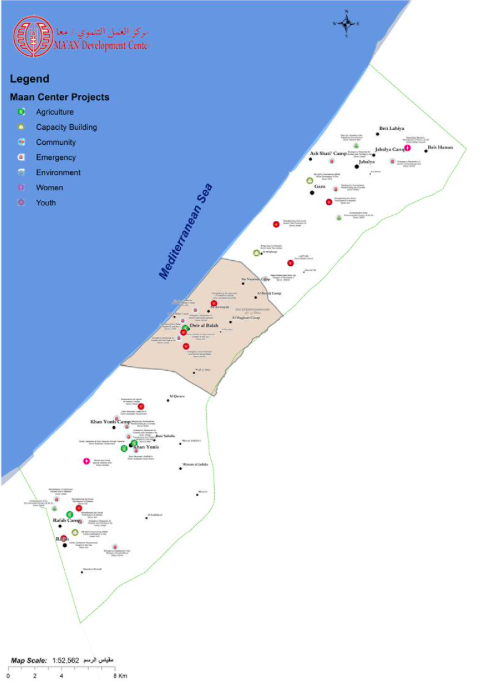Context
The situation with regard to food and nutrition in Palestine is closely linked to the political situation and the conflict with Israel, a neighbouring country that is hampering the ability of the Palestinians to meet their basic needs in a number of ways. The sector's capacity is very limited (confiscation of land in the buffer zone, which affects 35% of arable land, work/import bans, uprooting of olive trees, soil pollution linked to the military conflict, restrictions on fishing areas, etc.), while the country needs to create professional outlets for a growing young population - whose median age is 21 - but above all to be able to feed everyone with quality produce. This dual challenge - combining productivity and quality - cannot be achieved against a backdrop of chronic military conflict, at a time when global food inflation (+14.5% in February 2023) continues to rise as a result of the Russian-Ukrainian conflict. The Palestinians have few resources, donors have fewer guarantees, and there is progressively less incentive to intervene on the ground.
To make up for some of the shortcomings, the Ma'an Development Centre - which means "together" in Arabic - was founded in January 1989 as a not-for-profit organisation. Its head office is in Ramallah and there are four branches in Gaza, Khan Younis, Tulkarem and Jenin. Ma'an's main objective is to create autonomous initiatives that enable the sustainable development of human resources in Palestine, through an approach that combines the values of self-sufficiency and empowerment. Key groups are targeted: rural women, young people and teenagers, farmers, NGOs and community-based organisations (CBOs), agricultural engineers and consultants.
Project
The Ma'an Development Centre has several programmes dedicated to its target groups, including a programme dedicated to agriculture and food security, which has identified the sector's priorities and prioritised certain activities according to needs.
Firstly, support for farmers affected by the construction of the separation wall and the rehabilitation of damaged infrastructure to encourage and protect the link between farmers and their land.
To improve the sustainability of farms, water harvesting measures (bridges, cisterns) have been developed, not forgetting the development of agricultural services and advice to encourage organic farming and responsible pest control.
Lastly, a final strand of action focuses on advocacy (national and international) to protect the rights - particularly land rights - of Palestinians and to fight against the violation of farmers' rights.
Results
Between 2009 and 2015, this programme, run by the ma'an development centre, has had a positive and lasting impact on a range of issues. Land has been rehabilitated (1,708 dunums for 576 families in 6 years), soil has been decontaminated and treated, seeds have been distributed to encourage the spread of olive, lemon and almond trees, not forgetting the olive trees already planted during the project in Tulkarem, which earn AU$120 per dunum.
190 farmers were supported in the development of greenhouses, which increased their productivity by between 42m2 and 225m2. As for livestock farming, the beneficiaries are exclusively women who have been able to generate more income thanks to various distributions (429 beehives, anti-parasite products, inputs, 123 production units for sheep, etc.) and repairs to infrastructure, including 80 dedicated to poultry.
Access to water has been improved thanks to irrigation work that has led to the installation of 3,440m of pipelines. 4,500 m3 of reservoirs have been rehabilitated in the village of Kur, reducing the price of water by more than 75%. As for farm roads, 7.8 km of roads have been renovated in Al-Kafriyat to improve access to 3,900 dunums of farmland. Every dollar invested in farm roads brings in an extra $7.5 in gross income for farmers, not to mention the increase in land value thanks to this improved accessibility - from $3,610 per dunum to $9,000-10,000 per dunum.
The Ma'An development centre's agriculture and food security programme has helped to meet immediate needs by increasing productivity in the sector, as well as long-term needs by providing appropriate training. Ultimately, the development centre hopes to capitalise on its efforts to cooperate and coordinate with the relevant stakeholders to develop a national food sovereignty policy.
Projects run by the Ma'an Development Center in the Gaza Strip:

Little Extra
The Ma'an Development Centre founded a permaculture centre called Beit Qad (Qad House) in 2013 on four acres in the far north of the West Bank. The aim of the centre is to produce food sustainably by capitalising on local practices. Since 2013, 964 people have taken part in training workshops on subjects ranging from beekeeping and integrated pest management to aquaculture and hydroponics. It is also a laboratory for developing new strategies on key issues such as rainwater harvesting.
This initiative sheet was written by Lana Khouildi, LF volunteer in March 2023.
Last modification : 29 Jun 2023.
Ma'an Development Centre
The MA'AN Development Centre is an independent, non-governmental and non-partisan Palestinian training and development institution, established in January 1989 and recognised by law as a non-profit organisation. The main office is located in Ramallah and the four other offices are located in Gaza, Khan Younis, Tulkarem and Jenin. MA'AN's work is driven by the need to create independent and autonomous initiatives that lead to the development of human resources, integrating the values of self-sufficiency and autonomy for sustainable development.